Not only do epic mass battles matter, but your diplomatic skills also play a major role in your success or failure during the campaign. In our Total War ROME 2 Politics Guide, we explain all political actions, introduce you to different government systems, and give you helpful tips on how to increase your influence and power. As a bonus, we’ll also cover common mistakes and show you how to avoid them.
Table of Contents
1. Basics of the Political System
Politics operates like a quiet war behind the scenes. It’s a conflict not fought with swords and arrows but through loyalty, balance of power, and influence. There is more politics in Total War ROME 2 than you might initially realize. Each faction has its own political system, made up of several parties or families.
At the beginning of the campaign, you choose one of these families as the ruling party. The other factions then serve as the opposition. All groups compete for power, influence, and loyalty, acting like real historical rivals in ancient times.
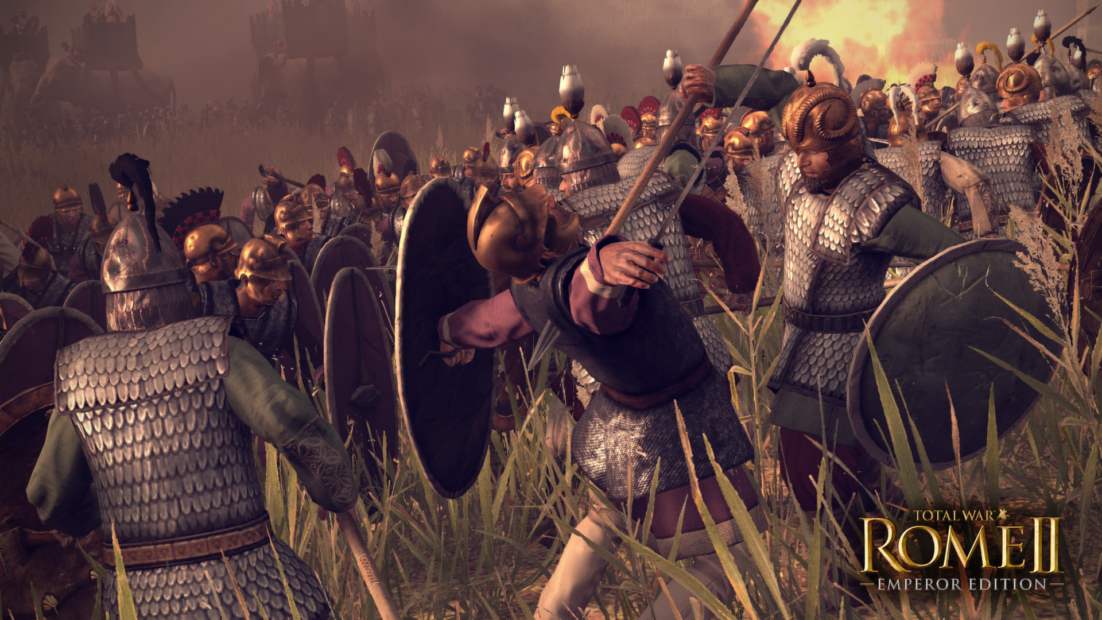
The core of the system is how power is shared within your faction. Each party has an influence value that indicates its political strength. To boost this strength, you need to work on the prestige, popularity, and reputation of individual characters. Especially successful generals or statesmen with high gravitas can quickly shift the balance of power.
A stable balance is essential for success in Total War ROME 2. Excessive influence on one side (even your own!) can be risky. If an opposition party becomes too dominant or loses too much loyalty, it might break away and incite rebellion or even a civil war.
You make most political decisions through the faction overview. There, you can see all the key characters, their loyalty, ambition, and party affiliation. From this screen, you can start political actions—such as promotions, bribes, or diplomatic missions.
2. Gravitas, Ambition & Influence
To truly understand the political system in Total War ROME 2, you need to know three key terms: gravitas, ambition, and influence. These values determine who makes decisions in your faction and who is just a spectator.
Gravitas refers to a person’s reputation. You can think of it as a combination of fame, respect, and public trust. A general who wins many battles naturally gains gravitas. Similarly, politicians can build prestige through leadership, speech, or diplomatic success. Each person’s character adds to their party’s influence with their gravitas, and the more prominent figures a party has, the more powerful it becomes.
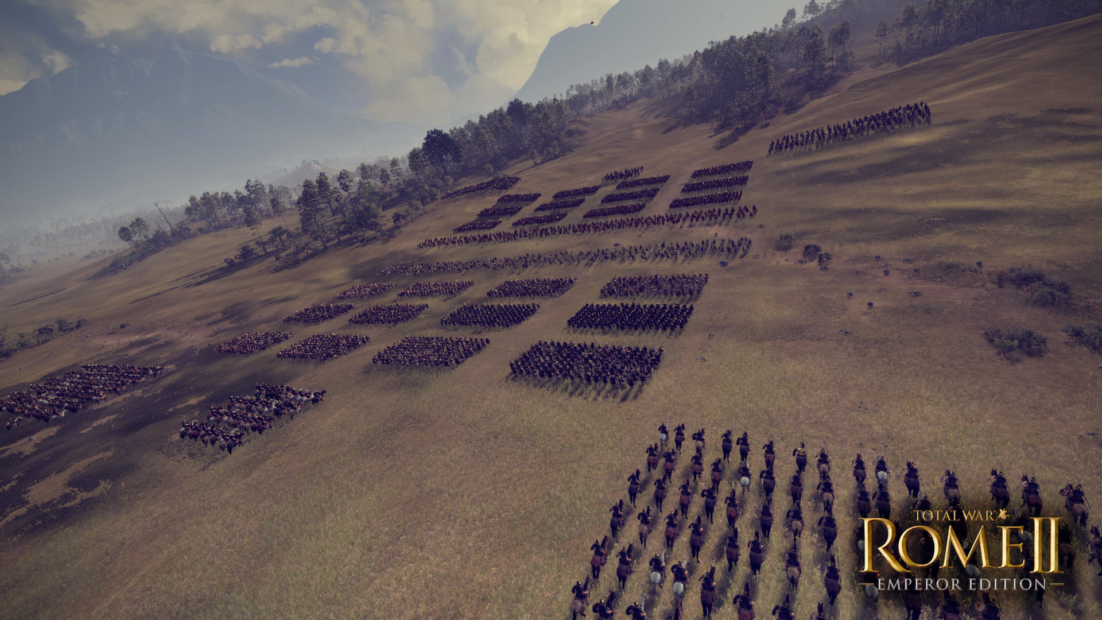
The second factor is ambition. An ambitious character aims for power and boosts the impact of their gravitas on the party. This can be a blessing or a curse: such figures help your faction gain influence but can also become dangerous rivals if they aren’t part of the ruling party. An ambitious, charismatic opposition general often sparks a rebellion.
The influence of a party in Total War ROME 2 is determined by the total of all its characters’ gravitas values. In the faction overview, influence is displayed as a percentage, indicating the level of political backing. A party with high influence has numerous supporters, including senators, nobles, and tribal elders.
To actively manage the power balance, you can promote individuals, arrange marriages, offer bribes, or even carry out assassinations. As noted earlier, your goal is to keep the balance. You need enough influence to rule, but never so much that everyone else unites against you.
3. Total War ROME 2 Politics Guide: Loyalty & Stability
If gravitas and influence constitute the core of your political power in Total War ROME 2, then loyalty is the blood that fuels it. Without it, your empire will gradually start to fall apart. No matter how many legions you command or how vast your empire becomes, without loyalty, you can’t succeed.
Each party within your faction has its own loyalty value. This indicates how satisfied they are with your leadership. High loyalty ensures peace and stability, meaning the party supports your decisions and maintains stability in the provinces it controls. However, if loyalty falls too low, distrust can grow, leading to intrigue and betrayal. Ignoring these warning signs may result in secession, where a party breaks away from you to form its own hostile faction. The outcome could be a civil war or complete secession.
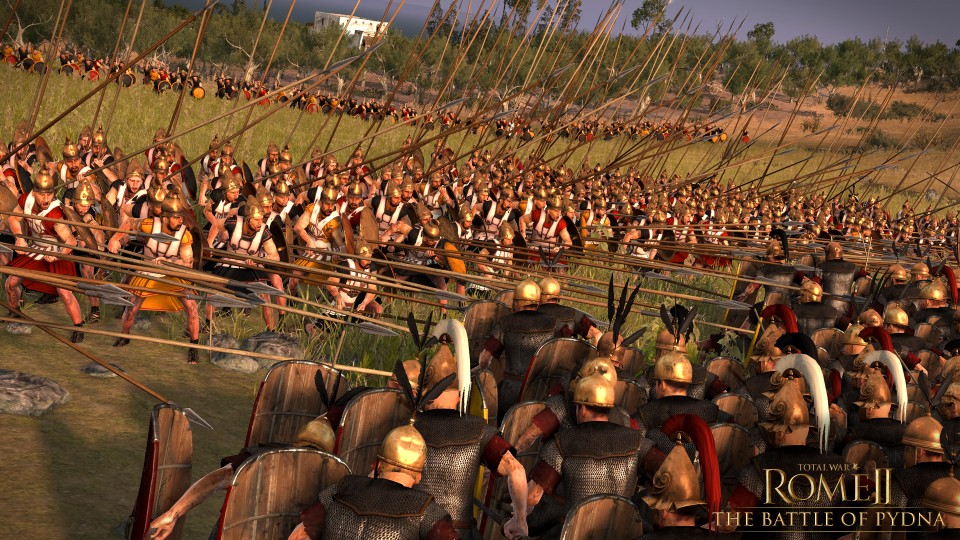
Various factors influence your loyalty in Total War ROME 2. Political actions such as bribery, promotion, or purges can have a direct positive or negative impact. The military successes or failures of a party’s generals can also alter loyalty. Especially in large empires with a high empire level, party satisfaction declines more rapidly, as maintaining power becomes increasingly tricky.
As a wise ruler, you must choose the right moment to decide whether loyalty should be bought, rewarded, or skillfully managed. Sometimes it is better to appease an opposition leader with a promotion or a feast rather than eliminate them. In other situations, deliberately provoking those who are dissatisfied can be strategically beneficial. This forces them to revolt, allowing you to ultimately crush them.
Think of the loyalty value as a gauge of your internal stability. When it is balanced, fair weather generally prevails in your empire. If it shifts the wrong way, a storm will gather in the Senate.
4. Characters and Their Roles
Politics never occurs in a vacuum. It depends on the people involved and is shaped by their interactions. Your faction has dozens of key figures, each bringing influence, gravitas, and loyalty.
The most well-known among them are your generals and admirals. They lead your armies and earn gravitas through military victories. Every win on the battlefield not only boosts their personal reputation but also increases their party’s political power. However, be cautious: a victorious general from an opposing party can quickly become a threat to you. Too much fame might lead him and his followers to believe they can overthrow you.
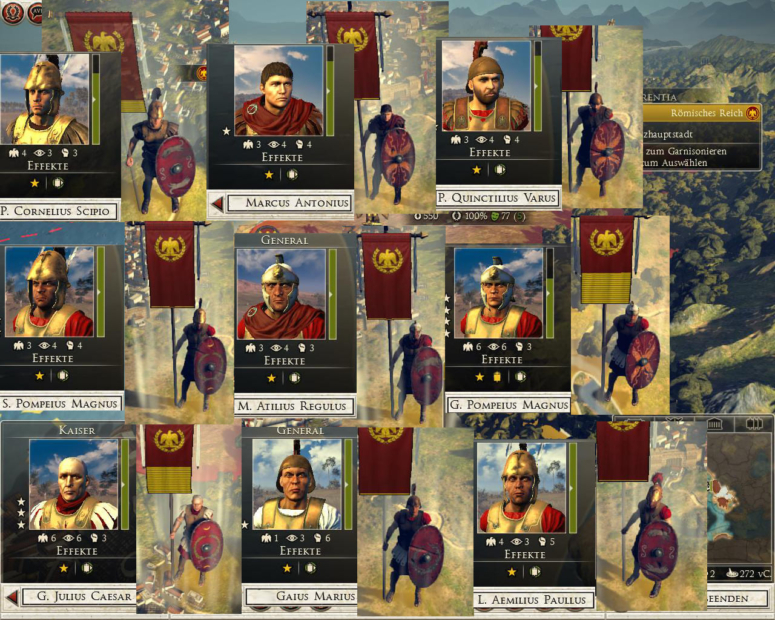
Besides generals and admirals, there are politicians in Total War ROME 2. They are the silent strategists working behind the scenes. They do not appear on the campaign map but remain in your capital, where they hold political office. Their gravitas adds to their party’s influence just as much as a general’s does. The only difference is that they gain power through politics and administration rather than through war.
You can appoint a politician to a command at any time to serve as a general. Conversely, it’s possible to retire a general so he can act as a statesman. These changes are free and give you a valuable tool for managing the political balance.
Some characters in Total War ROME 2 also have special traits or ambition levels that boost their political influence. Ambitious men seek promotion, honor, or to stay occupied. Ignoring them can cause their loyalty to turn dangerous. Therefore, control vanity and utilize your people’s talents before they turn against you.
5. Government Systems & Reforms
Not all powers are equal in Total War ROME 2. This is especially reflected in the form of government of your faction. Each culture begins with a specific type of government that determines how your empire operates, what bonuses you get, and what political actions are available. But nothing is permanent: over time, you can reform your government, which brings both opportunities and risks.
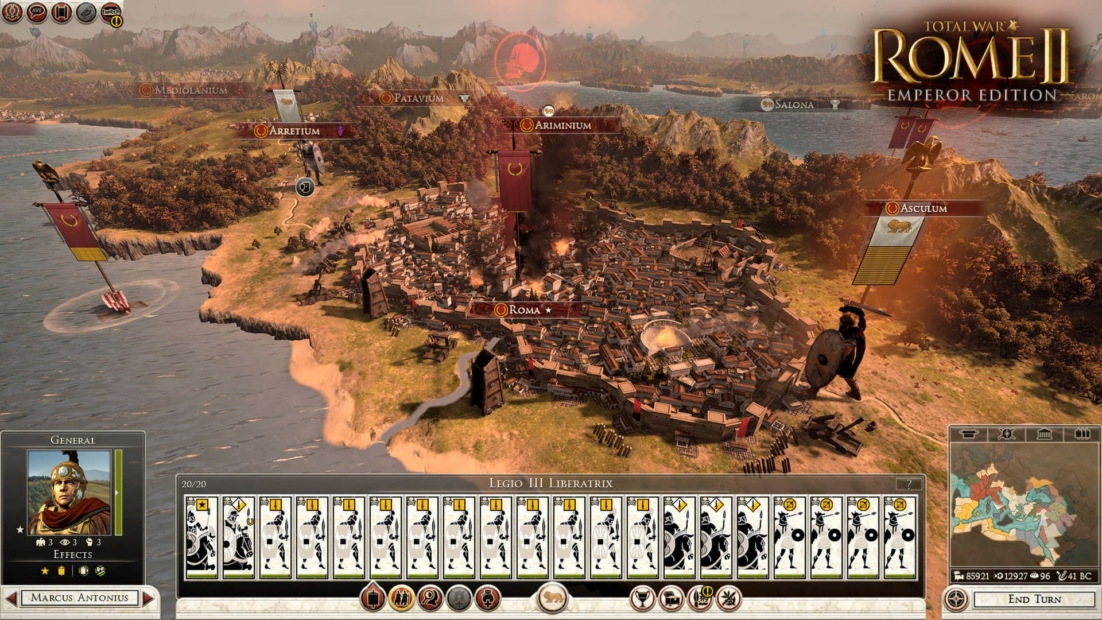
There are four basic types of government in total, which we want to introduce to you in our Total War ROME 2 Politics Guide:
- Republic: Power is distributed among parties, and loyalty matters more than total control. The republic suits factions with multiple families, like Rome or Carthage.
- Kingdom: A monarch or basileus governs all, and loyalty largely depends on the ruler’s personality.
- Confederacy: Multiple tribes or cities govern together, which creates diversity but may also lead to conflicts among factions.
- Empire: The highest level of government. It’s powerful, centralized, and filled with bonuses. However, the larger your empire grows, the harder it becomes to maintain loyalty among all parties.
The government system in Total War ROME 2 allows you to switch between different forms. This provides useful benefits, such as increased tax revenue, stronger armies, or more stable provinces. However, the change temporarily reduces stability. After all, people are initially wary of change, and the loyalty of the parties may decrease.
Not all cultures can adopt every form of government. As in history, traditions play a key role. For example, a Hellenistic city might lean toward democracy, but an eastern kingdom is unlikely to become a republic. Don’t rush reforms and consider changes to the system carefully. Otherwise, you will provoke the anger of your subjects.
6. The Empire Level
As you conquer new provinces and expand your empire in Total War ROME 2, your Empire Level rises. But it’s more than just a progress bar — it reflects how large and influential your faction is compared to others. The more power you have, the higher your responsibilities, and ultimately, the greater the potential for instability.
As your empire’s value increases, you can build more armies, send out more agents, and generally have greater freedom to act. On paper, this seems great, but the cost is high. Each time you level up, your sphere of influence grows, and so does the mistrust among your own people.
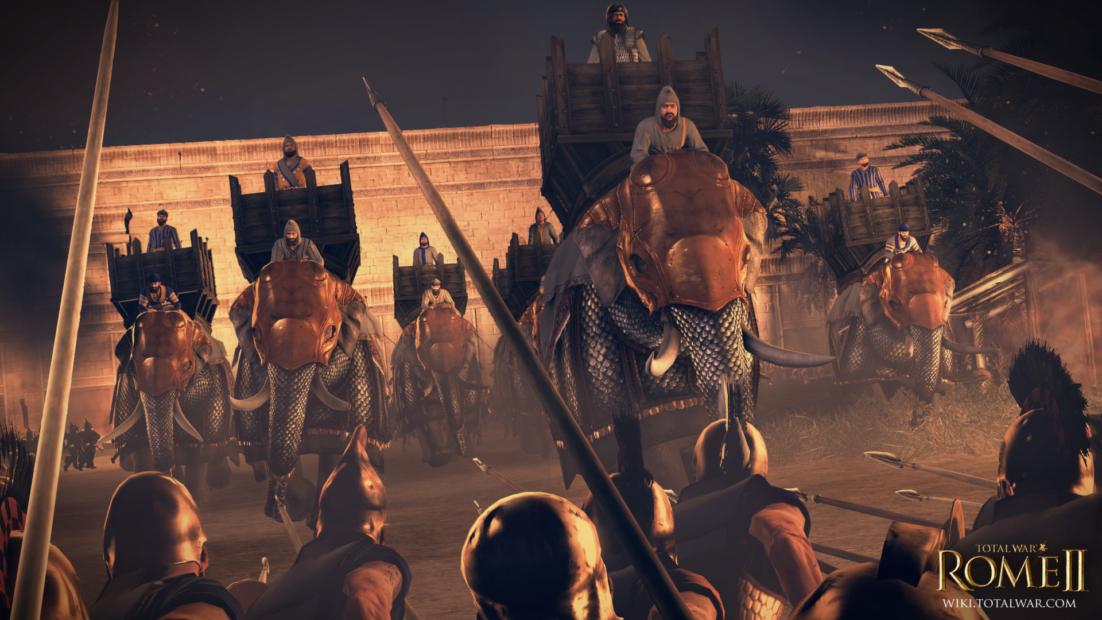
A powerful empire means that you gain more and more control. Not every faction or family likes this. Opposition groups often see you as a tyrant. Their loyalty declines, and the risk of internal conflicts grows. Especially in the late stages of the campaign in Total War ROME 2, rapid expansion can be more dangerous than any enemy army. It’s better to let your empire grow slowly and carefully instead.
It affects public order, your diplomatic relations, and the costs of political actions. Bribery and purges become more expensive in a larger empire, and reforms become riskier. At the same time, new faction traits and additional bonuses become available, such as improved recruitment and stronger economic effects.
The Empire Level reflects both your success and your vulnerability. It requires you to balance expansion and stability to avoid civil wars. However, don’t be too cautious either. If your empire grows too slowly, you’ll lose the race for dominance. It’s wise to keep reserve troops ready to win civil wars when needed.
7. The Faction Overview in Detail
Everything comes together in the faction overview, where you can see influence, loyalty, gravitas, and characters. Check the menu often to stay updated on the unseen forces behind the scenes.
You can access the faction overview in Total War ROME 2 by clicking the round icon of your faction in the center of the user interface. This opens a menu that displays all the key information about your internal politics. At a glance, you can see the influence of each party as a percentage. This indicates the current balance of power and whether a party is becoming too powerful or too weak.
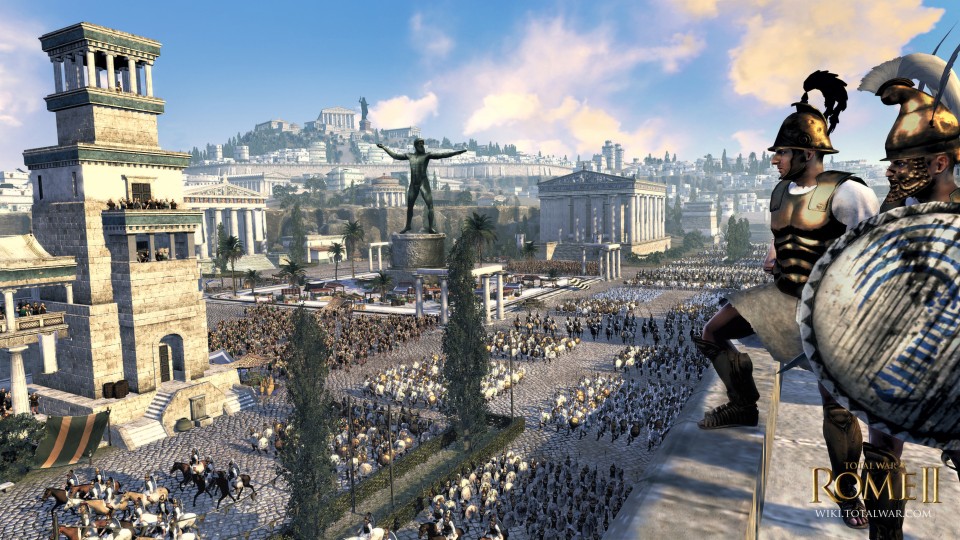
Just below, you’ll find a list of your key characters: generals, admirals, and statesmen. Their gravitas, loyalty, and ambition scores are shown right away. If you click a character’s portrait, a detail window opens, displaying their characteristics and possible political actions. This menu is used to secure promotions, engage in bribery, or even initiate intrigues.
The importance of your current government system in Total War ROME 2 can’t be overlooked. Here, you can see what bonuses it provides and if a reform is possible. Conveniently, it also shows the benefits of the new government system and how much instability the reform might cause. This helps you better evaluate the change.
The faction overview in Total War ROME 2 is your political control panel. It not only shows you the state of your government but also lets you intervene directly. By checking it regularly, you can spot dangers early and defuse them with a single click before they cause trouble.
8. Political Actions at a Glance
However, politics isn’t just a number on a menu. It depends on your decisions. Take political actions in the faction overview in Total War ROME 2 to influence the power balance, boost loyalty, or take out your rivals. Almost every move comes with a cost: either in gold, political support, or both.
Internal actions
Through promotions, you elevate a character to a higher office in the so-called Cursus Honorum (more on that later). Promoted characters gain greater gravitas, which in turn boosts their party. However, promoting opposition characters can also be helpful if it helps to ease tensions.
Embezzling funds is a risky but tempting way to acquire gold quickly in Total War ROME 2. If you proceed, a member of your ruling party will steal money from the state treasury. However, if it fails, the loyalty of the other parties will decrease significantly.
Sending administrators in Total War ROME 2 involves dispatching a statesman to a province to improve order and satisfaction. Using a member of the opposition for this can boost their loyalty. Conversely, selecting someone from the ruling party might, in the worst case, foster mistrust. Organizing a feast serves as a generous gesture that can enhance the food supply in a province.
Here, too, a banquet in the name of the opposition reinforces loyalty, while self-praise sparks suspicion.
Power games and intrigues
Through bribes or adoptions, you attempt to win over a character from another party to your side. Bribery requires money and political backing, while adoption is usually limited to monarchies. Both methods influence authority and can significantly shift the balance of power.
The most effective way to guarantee loyalty in Total War ROME 2 is by offering money to a dissatisfied party. The more powerful the party, the greater the cost to appease them. This tool helps you prevent rebellions before they start.
A rather brutal approach is purging. This involves removing or banishing members of the opposing party. While this weakens that party’s influence, it also decreases everyone’s loyalty. After all, you are now seen as a dictator.
If you want to create a conflict in Total War ROME 2, you can provoke one. For example, you can intentionally stir up a weak opposition to rebel. The action costs gold, but a deliberately provoked civil war can help you remove disloyal parties once and for all.
Diplomatic actions
The final political move is to send a diplomat. A statesman dispatched to a foreign nation can handle negotiations there. Depending on his success, he may bring back gold, rewards, or improved relations. If he fails, he’ll pay with his life.
9. Cursus Honorum – Career Ladder for the Elite
As previously announced, we also want to cover Cursus Honorum in our Total War ROME 2 Politics Guide. This is a progression of offices and titles through which ambitious characters advance. In the Roman world, it was the route from young politician to consul. In the game, it serves as a tool to secure loyalty, boost gravitas, and appease potential rivals.
Every statesman or general can attain different ranks throughout their career. Once a character has reached the required age and rank, you can promote them. With each promotion, their gravitas increases, along with their party’s influence. Additionally, the character gains special traits that provide military or civilian benefits, such as higher public order, stronger armies, or extra income.
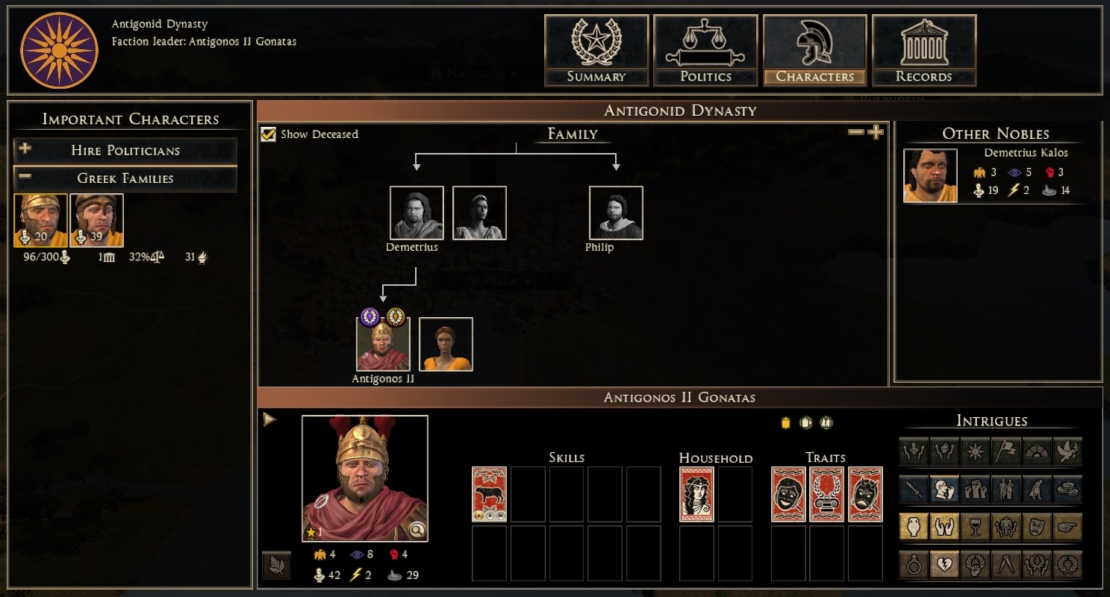
But every promotion in Total War ROME 2 has a cost. Along with increasing financial expenses, you lose some political backing, the so-called patricians. Too many promotions at once can thus harm your reputation, even if they boost your followers.
With the Cursus Honorum, you maintain control. If an ambitious opponent becomes too dangerous, a promotion can temporarily appease them. A high office gives them the feeling of being acknowledged and ties them more closely to your regime. Conversely, if you ignore their ambitions, there is an increasing risk that they will join the opposition.
10. Common Mistakes & How to Avoid Them
Politics in Total War ROME 2 is, in a sense, a game within a game. And in it, carelessness is punished. Many campaigns fail not because of enemy armies, but because of poor decisions made within their own senate. Here are the four most common pitfalls and how you can avoid them.
Inaction and Indifference
The biggest mistake is ignoring politics. If you focus only on conquests, loyalty and influence can grow unchecked in the background. A party can quickly become too powerful or too dissatisfied without you realizing it. Make it a habit to review the faction overview after every victory and defeat and plan your political strategy.
Excessive Concentration of Power
It seems tempting to fill all positions with members of your own party in Total War ROME 2. But too much influence makes you a target. The other parties feel ignored and start to scheme. Therefore, always keep a balance of power. Occasionally, make small concessions to the opposition to keep them quiet.
Ill-considered Promotions
Promotions in Total War ROME 2 boost gravitas as well as ambition. A strong, ambitious general can quickly become dangerous—especially if they aren’t part of your party. Therefore, promote wisely and consider whether you are comfortable with the increased gravitas.
No Plan for Crises
Secessions and civil wars are unavoidable if you play Total War ROME 2 for a long time. If you’re not prepared, you’ll quickly lose large parts of your empire. Keep reserve troops on standby. It’s best to provoke uprisings yourself if you know you can suppress them.
11. Rule Your Empire with PLITCH!
Our Total War ROME 2 Politics Guide gives you all the information you need beyond battles and skirmishes to succeed in your campaign. With the PLITCH Total War ROME 2 Cheats, it’s even easier to boost your power. Instantly secure maximum public order, add money to your treasury, or grant yourself infinite skill points. You can also increase the experience of your generals and armies whenever you want.
The single-player trainer lets you make battles and political intrigues both harder and easier. Use the codes to customize your run however you like.
Check out this blog to learn more about PLITCH, and visit our YouTube channel to see our cheats in action!
Happy Gaming!
You might also like:
